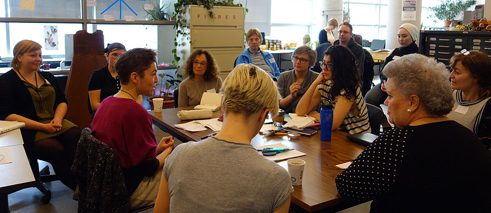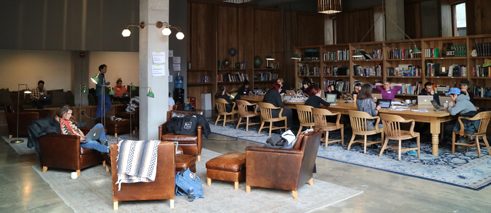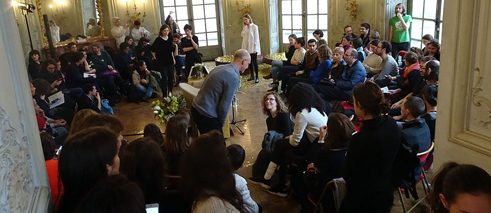The founders of the project Art+Feminism asked what would happen if a group of people took to Wikipedia at the same time to generate content that tries to address the gender disparity on the platform. Amber Berson, the Canadian ambassador for the global project, speaks about how every contribution counts.
Wikipedia is a publicly generated encyclopedia, a shared repository of knowledge. More than that, it’s the world’s free online encyclopedia, accessed by nearly 500 million unique visitors each month in more than 250 languages. The English version of Wikipedia hosts more than 4.5 million articles, all of them collaboratively authored and edited by volunteers. If there’s an article about you and your work, it’s because someone took the time to make one. Art+Feminism was created as a means to improve coverage of cis and transgender women and feminism and the arts on Wikipedia while also training more female-identified Wikipedia editors.
In 2011, Wikimedia - the parent organization that hosts Wikipedia - commissioned a participant study which found that only 9% of editors self-identified as female. Concerned with the consequences of knowledge creation being so heavily gendered, four friends - Siân Evans, Jacqueline Mabey, Michael Mandiberg and Laurel Ptak - founded Art+Feminism as an experiment in collective dreaming. They asked what would happen if a bunch of people took to Wikipedia at the same time to generate content in an underserved area - art. All four founder’s careers are focused in the art world: Evans is an arts librarian, who was working for Artstor at the time; Mabey is an independent curator, Mandiberg an artist whose work often makes use of Wikipedia, and Ptak is an artist and curator who co-wrote a book in 2013 titled Undoing Property? Art+Feminism now generates training materials for future editors and facilitates hundreds of Wikipedia edit-a-thons annually (Wikipedia Edit-a-thons predate Art+Feminism’s use of the model.)
Female-Identified Editors Make Quantifiable Change in Canada
In 2013, when Art+Feminism launched, I was approached to organize events in Montreal, Quebec, and in Kingston, Ontario. In the first year of the campaign, Canada officially hosted five events in Calgary, Alberta, at the Luke Lindoe Library at the Alberta College of Art and Design; in Dawson City, Yukon at the Klondike Institute of Arts and Culture; in Halifax, Nova Scotia at NSCAD University Library; in Montreal, Quebec, at Eastern Bloc (co-hosted by Studio XX, revue .dpi and Skol); and in Toronto, Ontario at Art Metropole. In 2017 there were officially 23 events hosted across Canada and in 2018 there are 25 scheduled events. Nearly all events happen in the month of March, around International Women’s Day (March 8), though a handful of nodes host events at other times, or continually throughout the year. For example, the Art Gallery of Ontario hosts an edit-a-thon on a different theme, bi-monthly.
-
 © Valerie Tremblay Blouin [CC BY-SA 4.0]
© Valerie Tremblay Blouin [CC BY-SA 4.0]
Art+Feminism Wikipedia Edit-a-thon in Montreal in 2016
-
 © AWang (WMF) - Own work, CC BY-SA 4.0
© AWang (WMF) - Own work, CC BY-SA 4.0
Art+Feminism Wikipedia Edit-a-thon 2017 in New York
-
 © X-Javier (Own work) [CC BY-SA 4.0]
© X-Javier (Own work) [CC BY-SA 4.0]
Art+Feminism Wikipedia Edit-a-thon 2017 in Paris
In Montreal, the first Art+Feminism Wikipedia edit-a-thon took place at the Eastern Bloc lab, a community space housed in the artist-run centre of the same name. Members of the centre were present to answer questions and were actively involved in helping run the event. Other affiliated centres and feminist art groups included Skol, .dpi Journal and Studio XX. The daylong event was followed by an informal discussion over food and drinks at a local bar. Over thirty-five people participated in person, with other Montrealers participating remotely. Of the people who came to Eastern Bloc, half had no Wikipedia contribution experience whatsoever, one quarter had limited experience and one quarter were already proficient at contributing. We organized into mini-groups and went over video and web-based tutorials, with groups forming based on people’s individual learning styles. We also tapped into the broadcast tutorial from Eyebeam, which acted as the centralized venue for the project. Some people stayed the whole day, while others popped in and out. People were really keen to help each other out, with both content and form. It was a really nice time and very welcoming. The participants came from all demographics and gender-identifications.
In 2015 and 2016 the Canadian Women’s Art History Initiative (CWAHI), based at Concordia University, hosted the Montréal Edit-a-thons and in 2017 we moved the event to the Bibliothèque et Archives nationales du Québec (BAnQ) to accommodate a larger audience. In addition to offering training on how to use Wikipedia as a platform we also offered an annual workshop on the subject of bias on online platforms (gender, racial or other types of bias). This workshop was led by Anne Goldenberg, who wrote her dissertation on the subject of bias on Wikipedia. As the initiative grew, various community and university groups hosted smaller Edit-a-thons in parallel to the annual larger one. We benefited greatly from the support of Benoit Rochon, president of Wikimedia Canada, and his colleagues at the Association Francophone Pour Le Savoir (ACFAS), who provided technical aid throughout. The support of these organizations allowed the Montreal events to grow significantly. We were equally able to support their work by making available our teaching tools and by providing English language training at events they hosted. We have also seen our model replicated in other disciplines, such as a night of Linguistics+Feminism.
And we aren’t stopping anytime soon
Because we have often worked with CWAHI, most, but not all, of the new pages created by Montreal participants, are of historical Canadian artists. Examples of pages created during one of our events include: Elise Gravel, a Montreal-based living children’s book author and illustrator; Julie Tremble, a Montreal-based living filmmaker and animator; Jacqueline Hoang Nguyen, a Montreal-born, Stockholm based living visual artist; Inuit carver, Qaunak Mikkigak; and Canadian dub-poets Lillian Allen, Lorena Gale and d’bi young. Internationally, in 2017 an estimated 2000 new pages were created. However, at the Montreal edit-a-thons, we find that participants are more eager to modify or to translate pages than to create new content. This is in part because of time constraints but is also related to the wealth of material requiring translation. In 2018 Art+Feminism partnered with Artexte and the Musée d'art contemporain de Montréal (MACM) to host an event and there will also be a satellite event at the Université de Montreal.
In 2013, when I accepted the invitation to work with Art+Feminism, I never anticipated the impact the project would have on the ways in which knowledge is preserved. Being part of a community that is working so hard to combat the erasure of voices and to shed light on marginalized players and institutions in the art world has radically changed the way I work as a curator and as a historian.